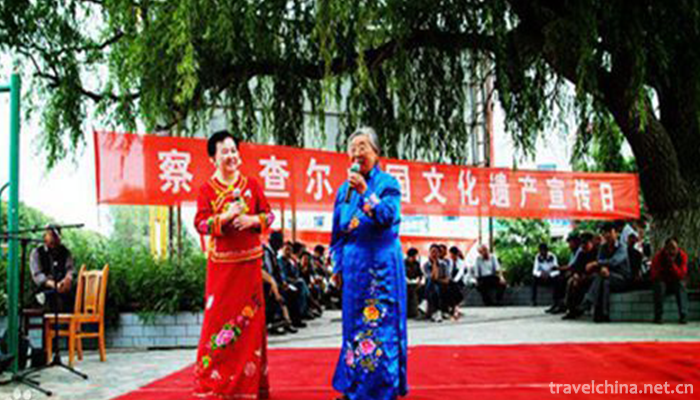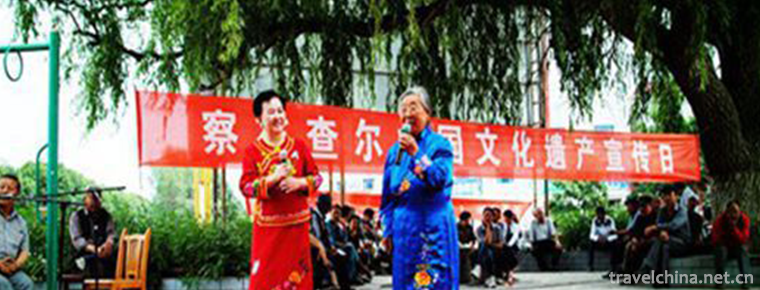Xibo Folk Songs
Xibo Folk Songs
Xibo folk song is an important kind of traditional music culture of Xibo nationality, which is widely spread among the Xibo people in Chabchal Xibo Autonomous County and Xinjiang. Folk songs are an important part of Xibo folk traditional art, which can be roughly divided into field songs, folk songs, nursery songs and narrative songs. There are few Xibo folk songs, but their modes are very complicated. Four tones, five tones, six tones, seven tones and more than twenty kinds. There are many special modes.
In November 2014, "Xibo Folk Song" was approved by the State Council to be included in the fourth batch of representative projects of national intangible cultural heritage.
historical origin
Xibo folk songs have a long history. They have been produced as early as the fishing and hunting culture period. For example, Aquinas and Butterfly Dance Songs have been spreading among the people all the time. They have gone through different stages of historical development and enriched the kinds of Xibo folk songs. They not only shine brilliantly in the humanistic spirit and social life of the Xibo people, but also become a display of the national tradition, national spirit and national life of the Xibo people. An artistic expression of character.
For generations, Sibo people, who are good at horseback riding and archery, often use Hunting and scattering as folk songs. Warm and unrestrained full sense of rhythm, and simple dynamic singing complement each other.
artistic characteristics
Content classification
Xibo folk songs can be divided into ancient Xianbei folk songs, fishing and hunting songs, shaman songs, narrative songs, field songs (love songs), custom songs, persuasion songs, motto songs, children's songs and new folk songs. Ancient Xianbei folk songs in Weishu Yuezhi contain records of such Xianbei folk songs as "Song of Achan" and "Song of the Real Man for the Real Man"; ancient fishing and hunting songs reflect the primitive fishing and hunting life in the period of mountain and forest culture; folk songs in the early Qing Dynasty include fishing and hunting songs, shaman songs, etc., and in the late Qing Dynasty there are field songs, custom songs, narrative songs, motto songs and nursery songs; folk songs in the period of the Republic of China are used for social improvement. Suggestion songs and aphorism songs are the main ones, such as Suggestion Song and Old People's Song. Folk songs after the founding of New China mainly eulogize the new era and new changes of folk songs such as "Chabuchar Good Place".
Melody lyrics
Xibo folk songs have their own fixed tunes, but there are no fixed lyrics. Every singer improvises according to different occasions. Xibo folk songs especially emphasize the rhyme of lyrics. Each line of lyrics requires rhyme of the beginning, middle and end. Therefore, singers are required not only to perform on the spot, but also to have the creative ability of poetry lyrics. This is a distinct feature of Xibo folk songs.
Representative Works
Azina is an ancient Sibo folk song. With its happy and graceful melody, it vividly reflects the primitive labor of the Xibo ancestors along the Nenjiang and Songhua rivers.
The Sibo Opera of Returning from the Northeast to the West is an immortal epic with a solid and well-founded narrative, especially for the Sibo people to establish an indestructible outlook on life, and to be eulogized from generation to generation.
"Song of Ages" sings about the Sibo people's amazing national spirit in the process of migration. At the same time, it summarizes some thoughts reflecting the law of their own survival and development in life.
"Jacina" Xibe folk song. "Jacina" means "black land" in Sibo. The history of the Sibo people's westward migration is that they have a deep feeling for their homeland.
Inheritance Significance
Xibo folk songs have been inherited from generation to generation in the Xibo people. In the eight catalogues of Xibo Autonomous County of Chabu Chal, a large number of folk song inheritors such as Tong Limei, Guo Xiaomei and Fu Yuqiang have emerged among the people. Therefore, the mass basis of Xibo folk song's singing, dissemination and inheritance is very deep. However, with the change of Sibo language environment, the number of people who use Sibo language decreases, and the survival space of this original ecological folk culture is shrinking. It is urgent to protect and inherit Sibo folk songs.


-
1.Quyuan Hometown Tourist Area
The cultural tourist area of Quyuan's hometown is located in Fenghuangshan, Zigui County, Yichang City, with a total area of 33.3 hectares in the north, Gaoxia Pinghu Lake in the north
Time 2018-12-12 -
2.Qianling Scenic Area
Qianling Scenic Area, located in Qianxian County, Xianyang, Shaanxi Province, covers an area of 1002.71 square kilometers. Population: 580,000 (2011), postcode: 713300.
Time 2018-12-22 -
3.Jiankou Great Wall
The Great Wall is located in Badaohe Township, northwest of Huairou District, Beijing suburb. It is 1141 meters above sea level and about 30 kilometers away from Huairou County.
Time 2019-01-21 -
4.Longtan Valley Ecological Scenic Spot in Xixia
Longtanggou Natural Ecological Scenic Area is located in Shuanglong Town Huashan Village, Xixia County, the hinterland of Funiu Mountains, Henan Province. It is 30 kilometers away from Xixia County
Time 2019-02-25 -
5.Duodi dances
Multi-place dance, Tibetan folk dance, is a unique way for Tibetan people to dance and sing. It mainly distributes in three areas of Zhouqu County, Gansu Province
Time 2019-04-28 -
6.memorial ceremony for Confucius
The sacrifice to Confucius is a grand sacrifice ceremony held mainly in Confucian temples for the sake of revering and remembering Confucius, which is a miracle in the history of world sacrifice and h
Time 2019-05-05 -
7.Shatar Mongolian chess
Mongolian chess is a popular folk sports game in Inner Mongolia. Generally speaking, there are two types of Mongolian chess, one is Shatar with 8 x 8 squares on the chessboard, the other is Hayashatar
Time 2019-06-03 -
8.Prince Wuwuwu quarrel
Prince Wujiaozi is one of the unique traditional folk dances in Beijing. It integrates entertainment, fitness and performance. Wujiaozi has a strong style, rough style, relaxation and generosity. Part
Time 2019-06-18 -
9.Central Crossing of Flyover
Zhongbian is a local traditional folk acrobatics in Beijing. Beijing's overpass is a prosperous and lively civilian market with a long history, well-known at home and abroad. During the reign of Emper
Time 2019-06-21 -
10.Panwang Festival of Yao Nationality
Panwang Festival is an important festival to worship ancestors Pangu, Pangeng and Panhu. People at home and abroad attach great importance to this national sacrifice ceremony. Launched by the Pan fami
Time 2019-07-11 -
11.Southwest Minzu University
Make great efforts, and the years will be golden. Southwest University for Nationalities is located in Chengdu, a famous historical and cultural city with the reputation of "the kingdom of heaven
Time 2019-08-31 -
12.Longtan Karst Cave Scenic Spot
Longtan Karst Cave Scenic Area is located at the foot of longcuban mountain, Miyi Baima Town, Panzhihua City, Sichuan Province, with an altitude of 1500 meters. It is a provincial-level scenic spot and a national AA level tourist area.
Time 2020-10-15